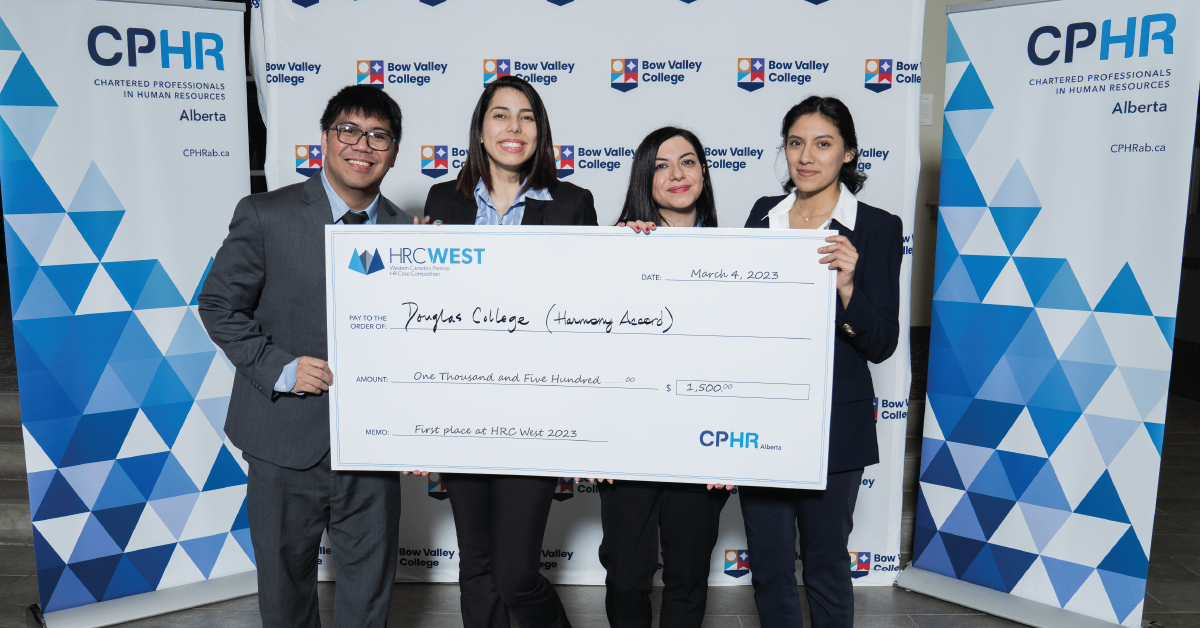
Western Canada HR Students Compete at HRC West Case Competition 2023

On March 3 and 4, 2023, CPHR Alberta, along with our partners at CPHR BC & Yukon, brought together 16 teams of students from post-secondary business programs across Western Canada. These students participated in a classroom learning competition dedicated to HR that merged theory with real-life simulations. The HRC West Case Competition two-day event provided post-secondary student teams with the opportunity to access a unique platform for the exchange of ideas with a comprehensive business case that explores a pressing HR challenge.
The competition hosting alternates between the two provinces, and is held at a sponsored school. After a break in 2021 due to the pandemic, CPHR BC & Yukon hosted the 2022 event virtually. 2023 was back in person, hosted by Bow Valley College in Calgary, Alberta.
“Bow Valley College was proud to host this prestigious competition, witnessing the next generation of HR professionals test their skills and knowledge in challenging scenarios. The collective enthusiasm and brilliant minds and ideas showcased are confirmation post-secondary institutions are graduating talented job-ready individuals,” says Alison Anderson, Dean of Business, Technology, and Centre for Entertainment Arts, Bow Valley College.
Schools competing from Alberta included:
- Bow Valley College, Calgary, Alberta
- MacEwan University, Edmonton, Alberta
- Mount Royal University, Calgary, Alberta
- Medicine Hat College, Medicine Hat, Alberta
- NorQuest College, Edmonton, Alberta
- Northern Alberta Institute of Technology (NAIT), Edmonton, Alberta
- Red Deer Polytechnic, Red Deer, Alberta
- Southern Alberta Institute of Technology (SAIT), Calgary, Alberta
- University of Alberta, Edmonton Alberta
Competitors from British Columbia included:
- Ascenda School of Management, Vancouver, British Columbia
- Camosun College, Victoria, British Columbia
- College of New Caledonia, Prince George, British Columbia
- Douglas College, New Westminster, British Columbia
- Okanagan College, Kelowna, British Columbia
- Thompson Rivers University, Kamloops, British Columbia
- Vancouver Island University, Nanaimo, British Columbia
Friday night opened with a welcome dinner for all participants, and included a special greeting and words of inspiration from the CPHR Alberta Board of Directors. Dinner was followed by networking amongst the student participants, team coaches, CPHR Alberta staff and board members, and faculty from Bow Valley College.
‘Investing in the future of our industry is important to our association, it helps us build a strong and vibrant HR community. This is why we have developed programs and networking opportunities, like the HRC West Case Competition, for our student members to help them thrive in a career in HR after graduation,” says CPHR Alberta CEO, Ioana Giurca.
Early Saturday, four pools of four teams competed in their first rounds of preparation and presentations. Students were provided a case written by a Chartered Professional in Human Resources (CPHR), and given three hours to study the case and prepare a presentation.
By Saturday afternoon, four teams progressed to the final round to present their ideas and strategies to our three esteemed CPHR designated judges.
Congratulations to all of the teams that participated, and to the top four teams who were presented with cheques at the AccessHR Student Awards Reception. The top four teams were:
In fourth place , Bow Valley College; Vitoria Regina Moreira, Jenica Montemayor, Hazelle Astorga, Maria Zakula. Team name, People Connect, coached by Svetlana Miftahov-Rapoport
In third place , Camosun College; Jessi Carr, Sam Montague, Samuel Saunders, Francis Lecours. Team name, Case of the Mondays, coached by Dale Samsonoff.
In second place , Vancouver Island University; Tegan Bond, Paige Lum, Levi Hunter, Jody Marshall. Team name, HARMOUR, coached by Paul Cleaver.
The 2023 HRC West Case Competition winner, in first place, Douglas College; Munoz Hernandez Damaris, Juliana Costa de Avila, Lambert Adrian V Tenorio, and Niloofar Maleki. Team name, Harmony Accord, coached by Jeffrey Ha.
“We were thrilled to place in the competition and congratulate the winning teams and all participants who made this experience memorable.” says Alison Anderson, Dean of Business, Technology, and Centre for Entertainment Arts, Bow Valley College.
Thank you to our 2023 sponsor, AccessHR and our host school Bow Valley College.
HRC West 2024 will be hosted in Victoria, British Columbia at Camosun College.
About CPHR Alberta
CPHR Alberta is the professional association dedicated to strengthening the human resources profession and upholding the highest standards of practice.
With over 6,000 members in major cities across Alberta, the Northwest Territories and Nunavut, CPHR Alberta is the fourth largest HR association in Canada.
CPHR Alberta is the exclusive registration body in Alberta for the Chartered Professionals in Human Resources (CPHR) designation, which is the professional standard in Canada. The CPHR demonstrates HR expertise, experience and ethical management of today’s human capital. CPHR Alberta is a provincial member of CPHR Canada.
For more information about the 2023 HRC West Case Competition contact: Avneet Sidhu, Post-Secondary Coordinator, CPHR Alberta at asidhu@cphrab.ca
About CPHR BC &Yukon
CPHR BC & Yukon is a non-profit organization specializing in advancing professional people practices. Committed to providing leadership in HR excellence, CPHR BC & Yukon is the foremost professional association for HR practitioners throughout the province.
Founded in 1942, CPHR BC & Yukon is a democratic organization governed by a volunteer Board of Directors elected by the membership. As the largest HR association in Western Canada, CPHR BC & Yukon has grown to include close to 7,000 members encompassing CEOs, directors of HR, consultants, educators, students, HR generalists, and small-business owners.
The association is the sole BC grantor of the Chartered Professional in Human Resources (CPHR) designation and is responsible for upholding industry standards. In addition, as the largest HR association in Western Canada, CPHR BC & Yukon offers professional learning and networking opportunities including workshops, symposia, events, and an annual conference and showcase.
For more information on the 2024 HRC West Case Competition contact: Carolyne Taylor, Member Relations Manager, Vancouver Island, CPHR BC & Yukon at ctaylor@cphrbc.ca
The views and opinions expressed in this blog post belong solely to the original author(s) and do not necessarily represent the views and opinions of CPHR Alberta.





